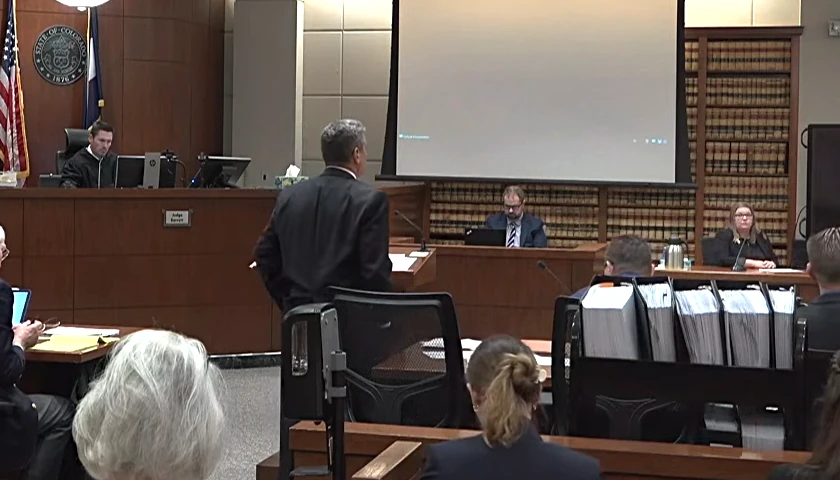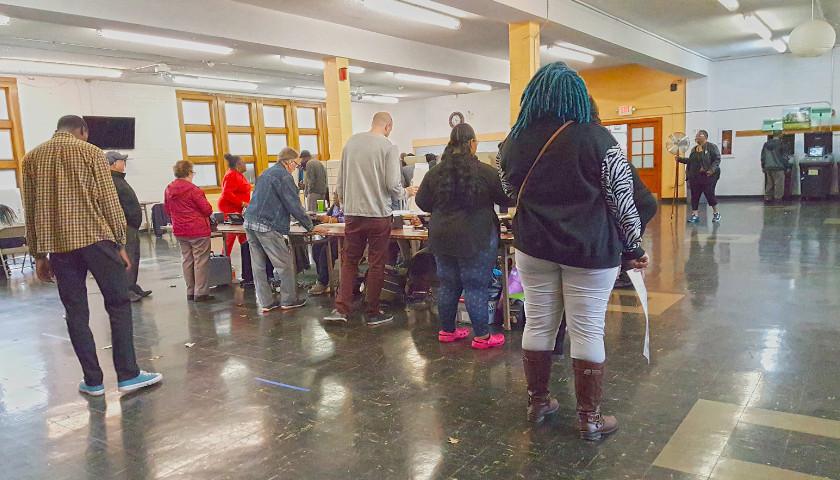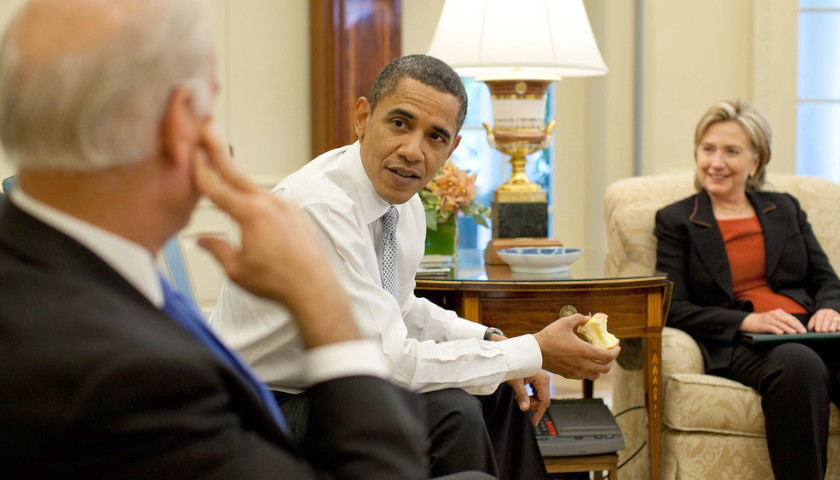The third fully live streamed day of the trial against former Mesa County Clerk and Recorder Tina Peters featured testimony from a partisan election employee who sobbed for about five minutes while speaking, as well as backtracking from other witnesses when cross-examined by Peters’ attorney. Peters is being prosecuted for her role in attempting to take a video of a software update on Dominion voting machines. She was concerned that overriding the election files with the upgrade would violate both state and federal law requiring retention of files for 22-25 months.
Stephanie Wenholz, the elections manager for Mesa County, broke down in tears when asked about the day she found out that the Colorado Secretary of State’s (COSOS) office was investigating Mesa County over the incident. Although Wenholz admitted that Peters instructed employees not to speak with law enforcement, but to direct them to her and her attorneys instead, Wenholz said she contacted Detective James Cannon, the chief investigator for the Mesa County District Attorney.
Wenholz has a history of posts on X revealing that she is an election fraud denier. Last year, she posted, “This breaks my heart. I understand the difficulty of being an Election Administrator. I am proud of what I do. I will always stand up to corruption and do what is right. Hounded by baseless voter fraud allegations,” linking to an article that said concerns about election fraud in Virginia were “baseless.” The article interviewed election officials who said they quit their jobs after being confronted with concerns by Republicans about election fraud.
This breaks my heart. I understand the difficulty of being an Election Administrator. I am proud of what I do. I will always stand up to corruption and do what is right
Hounded by baseless voter fraud allegations, https://t.co/SqYxPRfej3 via @nbcnews
— COMtnGirl (@StephWenholz) April 10, 2023
Also last year, Wenholz reposted a CBS News article that the station described, “A special edition of ‘Red & Blue’ focuses on our democracy and election denialism.” In 2022, she posted, “Defending Democracy” next to a post about her and another employee receiving awards despite the ongoing Peters lawfare. Later that year, she reposted an article about an employee turning on Peters.
Wenholz (pictured above) praised Maricopa County Supervisor Bill Gates, an election fraud denier, in two posts. In one of those posts last year, she said regarding his announcement that he would not be running for reelection, “Truly an incredible human! I am very blessed to have this man as a friend. This is bittersweet. I am so excited to see what @billgatesaz is up to next, but super sad for democracy and what he has done.” Another post said she was “blessed to know” Gates, “the light at the end of this tunnel,” and said she was “crying” after reading an article about his PTSD.
During her testimony, Wenholz said she was required by Peters to attend a speech by mathematician Douglas Frank discussing phantom voters. She said it “was kind of like a revival … I was very uncomfortable at this event. I felt my safety was in jeopardy while I was there and I was ready to leave.”
Peters’ attorney John Case asked her during cross-examination, “Did anyone actually threaten you?” She responded, “No, it was more of the environment. It was anti-elections and administrators and what we do.”
Case asked her if Peters encouraged employees to be transparent with the public, and Wenholz said no, she and another worker encouraged employees to be transparent with the public, not Peters.
Much of the prosecutors’ direct examination of Wenholz went over a meeting she attended with Peters and a few others, which Wenholz secretly recorded without informing Peters. When asked if Peters committed a crime, Wenholz said she did after Wenholz left the meeting early. When Case pointed out that she was no longer in the meeting so she didn’t know what happened, she said the crime was letting non-employees view the Trusted Build. Case asked her what the difference was between her secretly recording the meeting and someone recording the Trusted Build. Wenholz said the difference was that the video of the Trusted Build was leaked to the internet. However, Peters was not charged with a crime for the alleged leak.
Case got her to admit that it was merely a “best practice” not to have the public present at the Trusted Build. “We didn’t feel that it needed necessarily to be in a law, yes … it would not have been a crime,” she acknowledged.
Much of the prosecution’s case focused on the aspect that IT professional Conan Hayes allegedly used the badge of IT professional Gerald Wood to access the Trusted Build. Case attempted to question the witnesses about that aspect. He asked Wenholm, “When the public comes in for the Logic and Accuracy test, do they have background checks?” The prosecution objected, stating the “elements are beyond the scope” and the judge sustained it.
In Maricopa County, a senior elections employee was caught on video in 2022 allowing another employee into an elections computer room using her badge. Matt Bibber, an election integrity investigator, said he requested public records for the employee who borrowed the badge and discovered the employee had also used the badge from an additional employee, and at times was alone in the room without those employees present. There has been no report of any of the employees being disciplined or prosecuted, and the incident received scant media coverage.
At one point during the trial, Case told the judge he would like to introduce a witness to testify about whether Mesa County owned the machines running the Dominion software. He said he wanted to show this justified Peters’ authority over them. District Court Judge Michael Barrett, who was appointed by Democratic Colorado Governor Jared Polis and who often seemed to be arguing on behalf of the prosecution, was unpersuaded, and finally Case gave up and said he would submit a written argument with fuller reasoning.
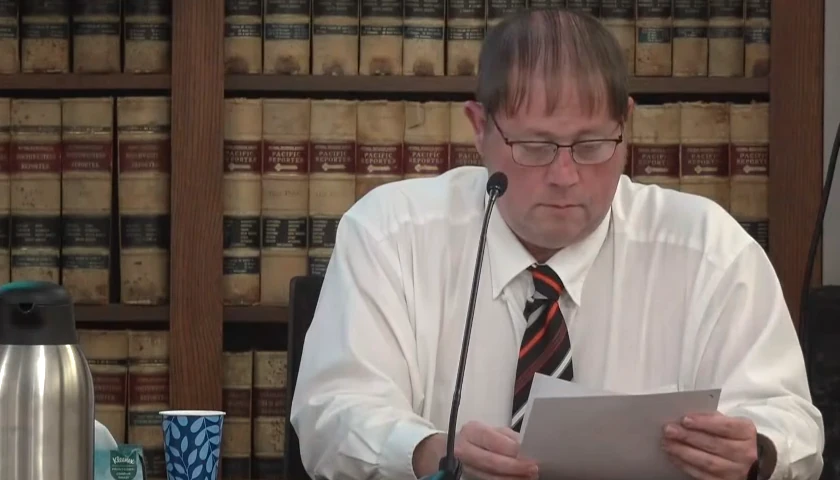
On the witness stand, David Underwood (pictured here), a lead support specialist with Mesa County who prepared login access for Wood, told the prosecution that Peters allegedly told him that Wood was a “state employee.” He added that if he’d known Wood really wasn’t a state employee, he wouldn’t have given him access to the computer systems.
However, when Case cross-examined Underwood, he admitted there was no requirement that individuals be state employees before being granted access.
Towards the end of the day, Case provided a lengthy description to the judge about testimony and exhibits he wanted to bring in regarding vulnerabilities with the Dominion systems. Barrett allowed him to speak mostly interrupted for about 40 minutes, but ultimately refused to let him bring in any of it.
Hartman wanted to bring in evidence regarding Mike Lindell’s subpoenas to 62 of Colorado’s 64 counties that use Dominion’s software. He said Lindell was trying to defend himself from a defamation lawsuit by showing files were deleted from the election systems. Hartman said destruction of evidence is a felony with 10 years in prison as a penalty.
He said he wanted to show that Dominion controls what county clerks back up. Clerks are required by state law to “maintain the access records and activity logs.” He cited a prosecution form from the DOJ which said electronic files are included. However, he said the “configuration logs are part of the logs that were deleted” in the Trusted Build. He explained that the “configuration log … says whether or not the machine can be accessed.”
Nor were the adjudication logs preserved, Case said. “People make decisions as election judges to determine a voter’s intent, that is preserved in the adjudication log.”
Hartman said “one of the biggest ironies in this case” is that when Cannon attempted to figure out who accessed the system on May 23, 2021, his outside consultant relied on the copy that Peters had made that was leaked to the internet, since the Trusted Build had “wiped” that information off the computer systems.
Next, Hartman said he wanted to bring in testimony to discuss the “Colorado export problem.” He said Jesse Romero, the voting systems manager for the COSOS Elections Division who testified last week, had brought this up. During the June 30, 2020 primary, the Dominion system failed to properly load the batches, Hartman said, and so within minutes, apparently over the internet, “Dominion was able to enter, apparently, because within minutes, they were able to diagnose and enter and tell the clerk, you need to go in after the Logic and Accuracy test and change and delete this batch file for the system to get out of a system called parallelism.” He said this was later renamed as the “Antrim County problem.” A photo was taken of a chip inside the Dominion system in Michigan which showed there was internet access, he said.
Hartman explained why Peters allowed some of the county employees to think that Case was really Wood. He said Case was working “undercover as an underground official,” and Peters promised him she’d protect his status. He’d already had a background check due to that status. He said case law established that it is acceptable for an official conducting an investigation to conceal information from the targets.
Additionally, he said there was an agreement when taking video of the Trusted Build that the passwords would be blurred. Witness testimony last week established that the Trusted Build creates new passwords, so the leaked video did not contain usable passwords.
Hartman pointed out that since the COVID policy was rescinded in March 2021, the public was allowed to view the risk limiting audit shortly afterwards.
The judge said he wasn’t going to hear any of the proposed evidence since he’d already decided Peters had committed a crime. “There are a lot of different ways the defense was given a remarkably robust opportunity to make a convincing argument for why I should let this in,” he said. “The problem, however, remains as it has been throughout this case, and that is that the defendant our role as the clerk and recorder, as an elected official, she could engage in an investigation, she could engage in deceit to accomplish her ends. The problem is, the ends can’t justify the means. There’s no case, there’s no law, there’s no rule that the court is aware of that would allow any public official, clerk and recorder or not. not to simply engage in a host of crimes in order to expose some other crime.”
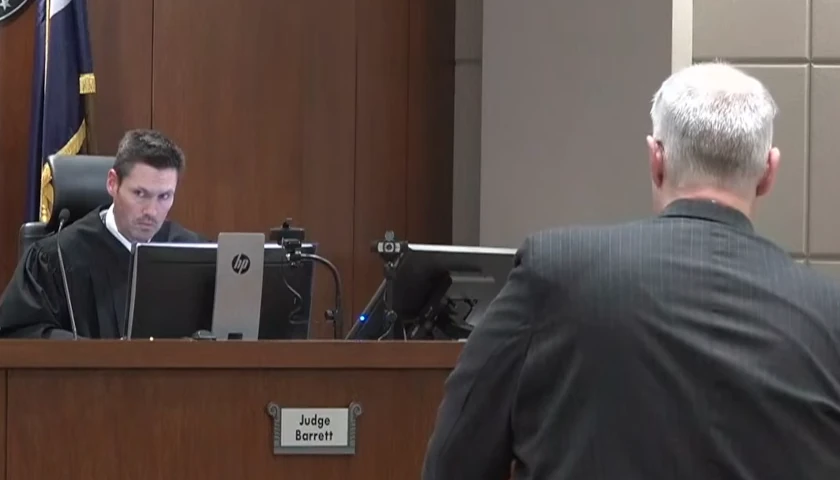
Barrett (picture here) said any evidence about illegally changing votes with the voting machines was irrelevant. “So at the end of the day, what it appears is the attempt here is to try and bring in all this evidence to show that other people were engaged in crimes, that the voting machines didn’t work, and none of those things had anything at all to do with what it is that the jury is going to decide,” he said. “None of the charges relate to computer crimes, none of the charges relate to anything relative to the Dominion voting equipment. And because of that, this type of offered evidence is just simply irrelevant. It is misleading. It is confusing. It’s a waste of time, and the like. And this is not the forum for the resolution of those issues.”
Danny Casias, a senior voting specialist and technological lead with COSOS, testified about being present at the Trusted Build. Hartman asked him if COVID protocols were in place, and Cassius said yes and that he wore a mask.
However, Hartman showed Casias a photo of himself at that time not wearing gloves, which were part of the COVID protocol. Hartman asked if he was prosecuted for not wearing gloves, and Casias said no.
Casias said Hayes was introduced to him at the Trusted Build as Gerald Wood, an MVD employee who would be transferring over to Mesa County Elections.
Case asked Casias, “Who designed what gets backed up? The clerk recorders, the Secretary of State, or Dominion?” The prosecutor objected, “Objection; lack of foundation, beyond the scope, relevance. The judge responded, “I’m going to sustain the objection as to relevance.”
Case attempted to ask Casias if he knew the difference between backing up Dominion election files versus rulemaking backups in state law, since that law “is something that he has knowledge about,” Case said. “He’s one of the rulemakers, and that relates to the requirements of an access record and an audit record.” The prosecutor objected based on relevance and the judge sustained it.
Casias admitted that there was always someone in the room when Hayes was there, and he did not see anyone make a video. He said he thought any wrongdoing occurred after the installation.
Case asked him to verify that the bios passwords are reset during the installation, and the judge refused to let him answer, sustaining the prosecution’s objection for relevance. Case pointed out that the clerks are not allowed to break the seal and get into the equipment. The prosecutor objected as irrelevant before Case could finish a question, and the judge sustained the objection.
Finally, Case got Casias to admit that the county controls who takes video of the Trusted Builds. The judge said the parties already stipulated that Peters took the video of the installation.
WesternSlopeNow is live-streaming the trial, and the schedule is posted on Peters’ website. The trial is expected to finish on August 12.
– – –
Rachel Alexander is a reporter at The Arizona Sun Times and The Star News Network. Follow Rachel on Twitter / X. Email tips to [email protected].

